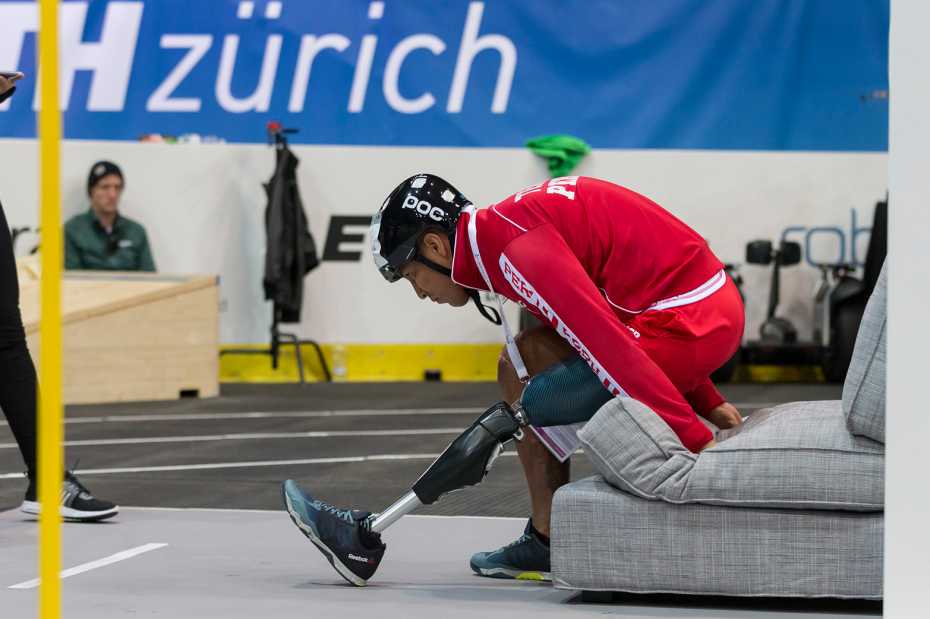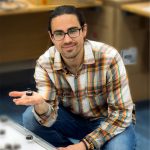
Robohub.org
CYBATHLON 2020 Global Edition: A competition to break down barriers between the public, people with disabilities and technology developers
Involving potential users of a particular technology in the research and development (R&D) process is a very powerful way to maximise success when such technology is deployed in the real world. In addition, this can speed up the R&D process because the researchers’ perspective to the problem is combined with that of end-users. The non-profit project CYBATHLON was created by ETH Zurich as a way to advance R&D of assistive technology through competitions that involve developers, people with disabilities, and the general public.

Over 50 teams from all over the world will compete against each other in the Cybathlon 2020 Global Edition. (Credit: Alessandro Della Bella / ETH Zürich)
This 13th and 14th of November, the CYBATHLON 2020 edition is taking place. The event will be live-streamed, and it is completely open to the public. You can access it through their website. Here’s the full programme for the two days:
Friday, 13 November 2020
4pm CET (3pm UTC): Brain-Computer Interface Race
The power of thoughts
- Welcome to CYBATHLON 2020 Global Edition!
- Kick-off by the head of competition, Lukas Jaeger
- Races of all teams
- Team stories and insights
- Analysis by the BCI expert Nicole Wenderoth of ETH Zurich
- Special guest: Joël Mesot, President of ETH Zurich
- The top 4: Who will win?
5pm CET (4pm UTC): Powered Arm Prosthesis Race
Grasping and feeling
- Races of all teams
- Team stories and insights
- Guest: Roger Gassert, researcher on assistive technologies at ETH Zurich
- Analysis by the arm prosthesis expert Michel Fornasier
- The top 4: Who will win?
6pm CET (5pm UTC): Functional Electrical Stimulation Bike Race
Power to the muscles
- Races of all teams
- Team stories and insights
- Guest: Robert Riener, initiator of CYBATHLON
- Analysis by Claudio Perret, expert in functional electrical stimulation
- The top 4: Who will win?
7pm CET (6pm UTC): Inside CYBATHLON – Stories, recap and outlook
Insights of the protagonists and organisers – the journey of CYBATHLON
- Robert Riener, initiator of CYBATHLON
- Roger Gassert, researcher on assistive technologies at ETH Zurich
- Florian Hauser, powered wheelchair pilot of team HSR enhanced
- Roland Sigrist, director of CYBATHLON
The medical checks
- Who can compete? Insights of the medical examiners Zina-Mary Manjaly and Jirí Dvořák
Focus: Inclusion
Recap and outlook
Saturday, 14 November 2020
1pm CET (12pm UTC): Powered Wheelchair Race
Overcoming stairs and ramps
- Races of all teams
- Insights of the head of competition, Lukas Jaeger
- Team stories and insights
- Guest: Roger Gassert, researcher on assistive technologies at ETH Zurich
- Analysis by scientist Sue Bertschy
- The top 4: Who will win?
2pm CET (1pm UTC): Powered Leg Prosthesis Race
Watch your step
- Races of all teams
- Team stories and insights
- Guest: Robert Riener, initiator of CYBATHLON
- Analysis by expert Lukas Christen, parathlete and coach
- The top 4: Who will win?
3pm CET (2pm UTC): Powered Exoskeleton Race
Walking in robotic suits
- Races of all teams
- Guest: Roger Gassert, researcher on assistive technologies at ETH Zurich
- Analysis by the exoskeleton developers Jaime Duarte and Kai Schmidt
- The top 4: Who will win?
4pm CET (3pm UTC): Inside CYBATHLON – Stories, recap and outlook
Insights of the protagonists and organisers – the future of CYBATHLON and social inclusion
- Silke Pan, Powered Exoskeleton Pilot of team TWIICE
- Robert Riener, Initiator of CYBATHLON
New systems
- Maria Fossati, powered arm prosthesis pilot of team SoftHand Pro
- Max Erick Busse-Grawitz, expert on mechatronics
- Roger Gassert, researcher on assistive technologies at ETH Zurich
Recap and outlook – the CYBATHLON @school and the next CYBATHLON
- Special guest: Sarah Springman, rector of ETH Zurich
- Robert Riener, initiator of CYBATHLON
- Roland Sigrist, director of CYBATHLON
The next CYBATHLON
tags: c-Research-Innovation, Competition-Challenge, cx-Health-Medicine





